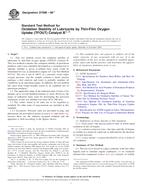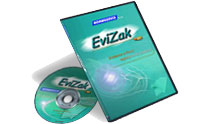Potřebujeme váš souhlas k využití jednotlivých dat, aby se vám mimo jiné mohly ukazovat informace týkající se vašich zájmů. Souhlas udělíte kliknutím na tlačítko „OK“.
ASTM D7098-08e1
Standard Test Method for Oxidation Stability of Lubricants by Thin-Film Oxygen Uptake (TFOUT) Catalyst B (Includes all amendments And changes 12/3/2015).
Automaticky přeložený název:
Standardní zkušební metoda pro oxidační stability maziv Thin-Film spotřeba kyslíku (TFOUT) katalyzátoru B
NORMA vydána dne 15.10.2008
Informace o normě:
Označení normy: ASTM D7098-08e1
Poznámka: NEPLATNÁ
Datum vydání normy: 15.10.2008
Kód zboží: NS-37541
Počet stran: 11
Přibližná hmotnost: 33 g (0.07 liber)
Země: Americká technická norma
Kategorie: Technické normy ASTM
Anotace textu normy ASTM D7098-08e1 :
Keywords:
oxidation stability, sequence IIIE engine simulation, TFOUT, Lubricants, Oxidation stability, Thin-film oxygen uptake (TFOUT), ICS Number Code 75.100 (Lubricants, industrial oils and related products)
Doplňující informace
| Significance and Use | ||||||||||||||||
|
This test method was originally developed to evaluate oxidation stability of lubricating base oils combined with additives chemistries similar to those found in gasoline engine oils and service. This test method is useful for screening formulated oils before engine tests. Within similar additive chemistries and base oil types, the ranking of oils in this test appears to be predictive of ranking in certain engine tests. When oils having different additive chemistries or base oil type are compared, results may or may not reflect results in engine tests. Only gasoline engine oils were used in generating the precision statements in this test method. |
||||||||||||||||
| 1. Scope | ||||||||||||||||
|
1.1 This test method covers the oxidation stability of lubricants by thin-film oxygen uptake (TFOUT) Catalyst B. This test method evaluates the oxidation stability of petroleum products, and it was originally developed as a screening test to indicate whether a given re-refined base stock could be formulated for use as automotive engine oil (see Test Method D 4742). The test is run at 160°C in a pressure vessel under oxygen pressure, and the sample contains a metal catalyst package, a fuel catalyst, and water to partially simulate oil conditions in an operating engine. In addition, the test method has since been found broadly useful as an oxidation test of petroleum products. 1.2 The applicable range of the induction time is from a few minutes up to several hundred minutes or more. However, the range of induction times used for developing the precision statements in this test method was from 40 to 280 min. 1.3 The values stated in SI units are to be regarded as the standard. The values given in parentheses are for information only. 1.4 This standard does not purport to address all of the safety concerns, if any, associated with its use. It is the responsibility of the user of this standard to establish appropriate safety and health practices and determine the applicability of regulatory limitations prior to use. |
||||||||||||||||
| 2. Referenced Documents | ||||||||||||||||
|
Doporučujeme:
EviZak - všechny zákony včetně jejich evidence na jednom místě
Poskytování aktuálních informací o legislativních předpisech vyhlášených ve Sbírce zákonů od roku 1945.
Aktualizace 2x v měsíci !
Chcete vědět více informací? Podívejte se na tuto stránku.




 Cookies
Cookies
